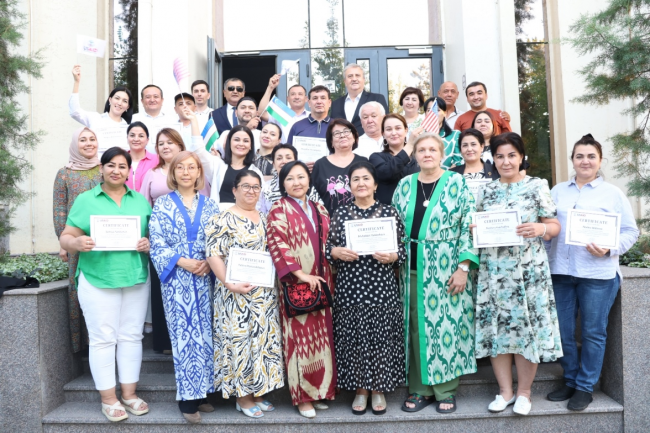- Main page ·
- Press room ·
- News archive ·
- Partnership "For the Development of Local Self-Government in the Kyrgyz Republic" Expands Its...
Partnership "For the Development of Local Self-Government in the Kyrgyz Republic" Expands Its Borders: Training for Non-Commercial Non-Governmental Organizations of Uzbekistan

In August 2024, representatives of the Partnership Programme "For the Development of Local Self-Government in the Kyrgyz Republic" shared their experience in strengthening the financial sustainability of non-profit organizations and the practice of promoting citizen participation in local self-government with colleagues from the non-profit sector of the Republic of Uzbekistan. The trip took place at the invitation of the USAID Local Government Development Assistance Project (USAID LGA Project).
The training was attended by leaders of non-profit non-governmental organizations (NGOs) of the Jizzakh and Navoi regions of the Republic of Uzbekistan, most of which work with vulnerable social groups of citizens, including people with disabilities, children and youth, women; some are NGOs working in the field of promoting human rights and access to information. The trainers were representatives of the Partnership member organizations: Chairperson of the Board of the Development Policy Institute Nadezhda DOBRETSOVA, Director of the Local Government Academy of Central Asia Asel KURMANALIEVA and Ulara NARUSBAYEVA, Deputy Head of the USAID “Successful Aimak 2” Project, implemented by the Development Policy Institute.
“The training was organized with the aim of increasing the potential of NGO leaders from two regions of Uzbekistan and transferring new knowledge and skills in two main areas – institutional and financial sustainability, as well as principles and mechanisms for citizen participation in the decision-making process. In both areas, we have extensive experience, certain achievements and lessons learned, which we shared with our colleagues in the process. The training participants studied the organizational aspects of the life of a non-profit organization as an enterprise, a structure that must carry out continuous activities, and not function in a "project", intermittent format, being completely dependent on external sources of funding," said trainer Nadezhda Dobretsova.
The training participants were also given an overview of the factors of financial sustainability of a non-profit organization, among which expenses often play an even more important role than income, and practical exercises were carried out jointly to identify unacceptable and distributed expenses.
A separate block dedicated to progressive and proven personnel management tools, including a registry of consultants, was presented by trainer Ulara NARUSBAYEVA.
The second part of the training was devoted to aspects of citizen participation in the decision-making process, during which the participants were presented with the experience of Kyrgyzstan. In particular, Nadezhda DOBRETSOVA spoke about the system of interconnected mechanisms of citizen participation in local development, the regulatory framework supporting this system and the practice of application, consisting of four main groups of forms of citizen participation in local self-government: political, consultative, initiative and monitoring1.
Trainer Asel KURMANALIEVA introduced the audience to practices of expanding women's rights at the local level, including measures to support women deputies of local councils.
"The gender quota is a best practice for countries in the Central Asian region. Given that Kyrgyzstan is on the threshold of the second election cycle with the quota, we considered that the lessons learned, the achievements of women deputies and the review of measures to support them are of practical interest to NGOs in Uzbekistan. We also shared our practice of targeted dissemination of information on local development among key stakeholder audiences through the Portal of Best Practices of Local Self-Government (www.myktyaimak.gov.kg), which was created in the process of public-private partnership, and the magazine “Municipality” (www.municipalitet.kg), which has become a rather successful practice of a commercial approach to NPO activities,” said the director of the Academy.
At the end of the training, some participants noted that this training helped them to understand the issues that sometimes arise during the preparation of budget estimates in project applications.
_________
1 All forms are described in the legislation and are widely used by local communities in Kyrgyzstan, which was illustrated using the example of real municipalities.

